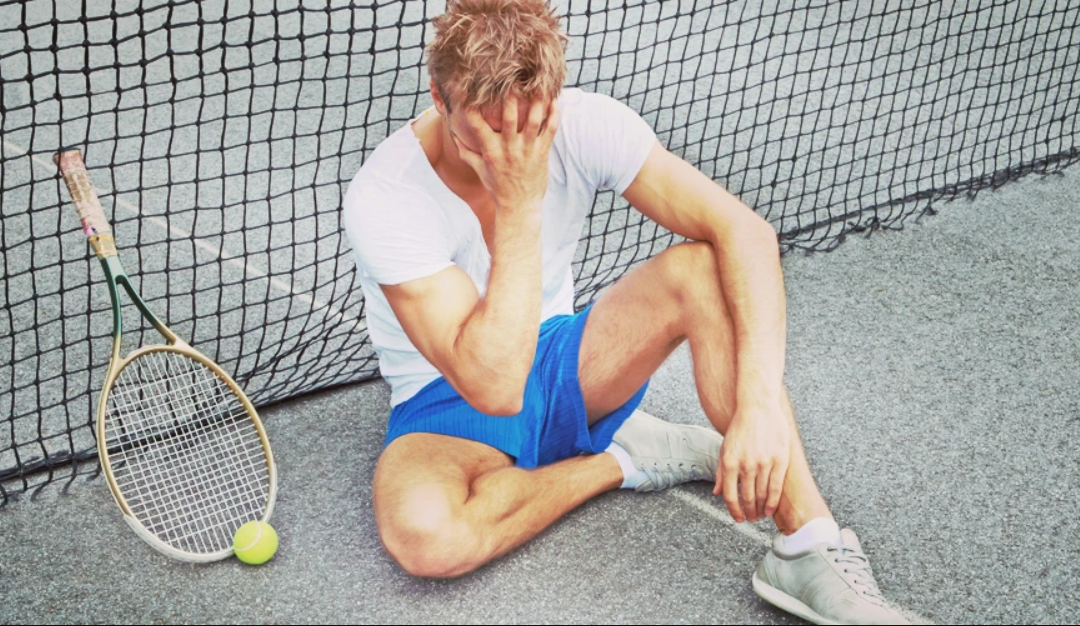Imagine you are playing a great match:
You have just won the first set.
You are hitting the ball really well.
In the 2nd set, you continue to have many breakpoints, game after game.
For example, at 3-3, you are up 0-40.
But then it becomes 15-40, 30- 40, deuce.
You keep telling yourself to play the same positive way that helped you win the first set.
But somehow, your arm is feeling tight, and you just can’t seem to play properly anymore.
Your opponent seems to sense your tightness and starts playing more aggressively.
Out of the blue, he has his first breakpoint and converts it immediately.
You lose the set and even though you have many more break chances in the decider, you no longer really believe you will convert them.
In the end, you are beaten in a match where you were the better player and were you dominated most of the match.
In other words, you have choked!
Choking means that you start playing below your capabilities and "forget how to play" because you feel nervous or anxious. Usually, this happens when the stakes are high and you really care about the outcome of a match.
For example, one of the most famous incidents that illustrate "choking" happened during the 1993 Wimbledon women’s final between Jana Novotna and Steffi Graf.
Novotna was leading 4-1 in the third set. She was two games away from winning the match, and her first Wimbledon title.
Suddenly she started making double faults and missing overheads.
Graf won the next five games, the match, and the tournament.
With the stakes being so high, and Novotna being so close to this landmark victory, it is likely that she started to overthink her shots and became overly self-conscious.
What makes us choke?
Robert Gray from Arizona State University conducted a very interesting study with both novice and outstanding intercollegiate baseball hitters and professionals.
In part 1 of this study, a loud sound would go off at random moments while the participants were going through hitting drills.
As they were trying to hit the ball, researchers would ask them to answer whether the volume of the background music was being increased or reduced.
For the novices, tracking the sound was extremely irritating and affected their performance.
They started missing more.
But for the experts, answering the questions made no difference, and their performance remained consistent.
In part two of this experiment, batters had to focus on their actions.
At random moments they were asked to say whether their bat movement was moving upwards or downwards.
Interestingly, now it was the novices who didn’t seem to mind the questions.
They were already focusing on their new techniques.
In fact, being self-conscious actually even helped them perform better.
At the same time, the expert batters started to struggle and began to miss more and more shots.
The reason for this was that they were so good at batting that they didn’t have to think about it.
Like the baseball hitters from the study above, you become tight as a tennis player whenever you start overthinking movements that normally come naturally to you, thanks to hours and hours of practice.
As a result, you start losing points you should be winning.
The reason for this is that you have two forms of thoughts:
On the one hand, you use conscious thoughts while trying to remember what you have learned, like for example how to hold the racket or how to toss the ball before a serve. Conscious thoughts require you to use effort and seek feedback so that you can gradually improve a skill.
However, after frequent repetition, you no longer need to think about what you do. Thanks to unconscious thoughts that work like invisible scripts, you can now hit a shot like your serve, without consciously thinking about the details of what you are doing. This gives you room to learn new skills and focus on our matches without worrying about your technique.
When competing, it is crucial that you can trust in your shots, without much reflection, as you depend on responding very fast to different match situations where you typically only have a split second to react.
This is why you need to be able to rely on your automatic shots.
However, what happens when you choke is that you care so much about the outcome of a match, you start fearing to make silly mistakes.
You are now monitoring your natural strokes.
This slows down and interrupts your natural shots. That’s why you experience a dip in performance in those pressure-filled moments of a match in which you would actually want to play your very best.
Instead of "just playing", you start thinking too much so that your hands feel tight, and you just don’t seem to be able to play properly anymore.
You start losing points you should normally win, and no longer know what you should be doing.
You either play too defensively and let your opponent control the important points, or you start over-hitting your shots and make easy unforced errors.
It is the classical situation of paralysis by analysis whereby you bring your conscious awareness to skills that normally happen naturally.
As you witness the match slip, you are thinking what a loser you are for messing up this opportunity.
You feel helpless, angry, frustrated, depressed, and worried that this will keep happening to you at important tournaments.
How to stop choking in tennis matches?
To become a great tennis player, you need to deeply care about your success.
At the same time, you shouldn’t care about winning during the actual tennis matches.
I call this the paradox of winning whereby the more you care about a match, the less you want to focus on the result.
This might feel counterintuitive:
- Instead of focusing on the outcome you want to focus on giving your best, point after point.
- Instead of focusing on the importance of your match, you want to focus to enjoy competing.
- Instead of focusing on what other people think, you want to focus on improving as a tennis player.
To help you do that, and prevent you from choking in your next tennis match, I created two practice drills for you:
Mental Drill #1: Double Thinking
To prevent yourself from choking during a match, you need to change the way you think about competing, and do what Mathew Syed calls "Double Thinking".
On the one hand, you want to care about performing well and achieving results- this is what will motivate you to practice hard.
At the same time, it is crucial to detach yourself from any outcome the second you step onto the tennis court:
You can do this by saying affirmations before a match like:
This is just a tennis match, nothing else. I am going to give my best and embrace the challenge.m
The less you care about winning and the more you cherish pressure-filled moments, the easier it will become to handle them.
Of course, there will still be moments where you might feel nervous and start choking.
In those situations, you can try Tim Gallwey’s bounce and hit tactic whereby you say "bounce" to yourself when the ball touches the court, and "hit" when the ball makes contact with your racket.
Doing this won’t give you time to worry about winning- this will automatically quieten your mind because quieter.
If you want more Mental Drills to upgrade the way you play your matches, you will love the Ultimate Guide to becoming a Mentally Tougher Tennis Player.
In this guide, you will learn:
- 13 mental toughness drills that will give you the confidence to fight hard and give your best regardless of the score.
- How to constantly improve your game, love the thrill of competition and become a world-class player by practicing less not more!
- What you need to do in those pressure-filled moments that make you feel so tense you can barely hold your racket!

Get your free PDF copy of my 25,430 words long epic Ultimate Guide To Becoming A Mentally Tough Tennis Player and learn:
13 mental toughness drills that will give you the confidence to fight hard and give your best regardless of the score.
How to constantly improve your game, love the thrill of competition and become a world-class player by practicing less not more!
What you need to do in those pressure-filled moments that make feel so tense you can barely hold your racket!
